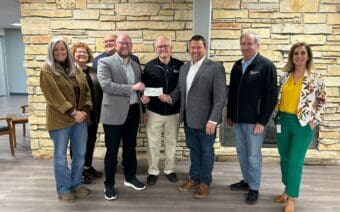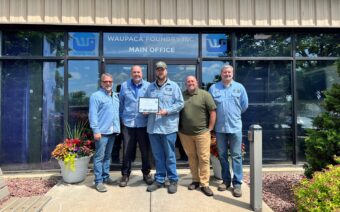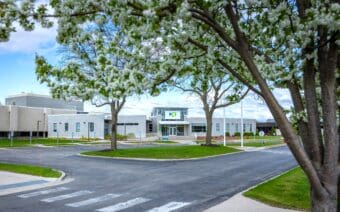
July 26, 2023
NORTHEAST WISCONSIN – In a continued effort to advance the maritime manufacturing industry and meet a growing workforce demand within the region – Fincantieri Bay Shipbuilding (FBS) and Northeast Wisconsin Technical College (NWTC) are expanding their training partnership for the next year.
Jim Draeger, NWTC’s dean of corporate training & economic development, said “in a nutshell, the program is about upscaling the incumbent workforce through customized training to meet employer needs.”
Draeger said NWTC is designated as a Center of Excellence for Domestic Maritime Workforce Training and Education by the U.S. Department of Transportation’s Maritime Administration.
As the only designated Center of Excellence on the Great Lakes, he said the college is committed to serving the region’s booming shipbuilding industry.
“NWTC has the flexibility and agility to quickly meet industry needs through customized training with our business partners, as evident by our continued partnership with FBS,” he said. “Our college is excited for future growth with the FBS training program to mirror our many successes with all industries across the district.”
A bit of background
The original partnership, Draeger said, dates back to the late summer/early fall of 2022 when FBS and NWTC collaborated on a six-month pilot program to upskill the workforce in light of the labor shortage.
Draeger said Fincantieri had and continues to have numerous governmental and commercial projects, and in an effort to combat the labor shortage, the company contacted the college in hopes of collaborating on a training program.
Through the collaboration with FBS, Draeger said a five-week training program was created to upskill new employees with little to no experience in welding, pipe and ship fitting to get them into entry-level positions in the shipyard.
Since the launch, Draeger said 97 participants have successfully completed the five-week course.
“We went through two six-month stints in 2022 and 2023, and it was wildly successful,” he said. “(It included) almost 15,000 hours of training, and almost 100 people went through the program. Then we decided to extend the partnership for another year through June of 2024.”
Draeger said the program helps boost the local economy by encouraging employees/students to stay local and also helps drive new talent to come to the area.
In the original planning stages, Draeger said NWTC’s subject matter experts worked closely with Bay Shipbuilding to find out what their immediate needs were.
The program is 40 hours a week, five days a week and covers everything from safety blueprint reading to turning on welding machines and more in-depth content.
While not a cookie-cutter copy of a similar program done in Fincantieri Marinette Marine – which has been running for more than a decade – Draeger said the program with Fincantieri Sturgeon Bay Shipbuilding was modeled after it.
“We have welding, pipe fitting and electrical training programs (at Marinette Marine),” he said.
With the increased workload at FBS, Draeger said there was a push to reflect the nuts and bolts of the Marinette programs but specialized to meet the needs of Bay Ship.
He said NWTC worked with the production managers at Bay Ship and developed customized training to meet the needs of the projects.
Draeger said the course provides a strong foundation so employees can enter the shipyard and complete a task with little to no supervision.
The program’s success prompted an increase in capacity, he said, from 12 participants to 16.
Draeger said the potential to add another 160 laborers within the next year is a huge boost to the Sturgeon Bay economy.
“Some of the businesses that are successfully navigating the waters – pun intended – of this labor shortage are upskilling by training and investing in their workforce,” he said.
Continued education options
Draeger said the five-week training is meant to be a tool for an employee to get their foot in the door quickly through an alternative pathway – noting it isn’t meant to take away from the two-year tech degrees.
Draeger said the college has had some of the entry-level cohorts coming back in to do two- or three-week intermediate training.
So, while this contract is focused on entry-level, Draeger said NWTC does carve out areas for people to come back and take that next step.
“This is a different entry point for workers and participants who may find college a little scary (or out of their reach),” he said. “They may think, ‘I can’t commit to a two-year degree, but I can commit to five weeks, get paid to go through the training and get on-the-job training.’”
Draeger said this helps create an opportunity to bridge that gap – and then enables those who want to continue their education to do so if they wish to pursue a degree.
“We have mechanisms in place in the college so they can start or continue their education with it being halfway completed from that training,” he said.
Next generation of employees
Draeger said there is no denying skilled tradespeople are in demand.
“We’re not just training laborers here – we’re setting folks on a path to becoming a skilled tradesperson with a starting point to build their career,” he said.
One may think a program like this would be geared toward those fresh out of high school or younger adults, but Draeger said the program has seen anyone from 19 years old to 46 years old.
He said one participant went from being a nail technician with a specialty in esthetician to welding – noting anyone can participate in the program and get a rewarding job.
“Bay Ship isn’t going to turn away anybody who wants a job,” he said. “They have such a demand with their workload – their recruitment efforts are extraordinary. Working with them on this collaboration to upskill and provide a new path is what’s so exciting about it.”
How does the partnership work?
Draeger said the process starts with a fresh cohort – meaning Bay Shipbuilding hires 10-12 new entry-level employees.
Their first day on the job is at the training center or in the welding lab on NWTC’s Sturgeon Bay campus.
Draeger said NWTC then identifies each participant’s strengths and continues to do so as they go through the content, curriculum and training, as well as upon completion of the training.
After completion of the course, Draeger said the instructor will sit down with the shipyard production team and discuss each participant’s best placement in the shipyard.

The training is customized to meet the needs of Fincantieri Bay Shipbuilding. Photo Courtesy of Northeast Wisconsin Technical College
From there, Bay Ship will get the employee into the yard and back into any additional training they may need.
As soon as the cohort is done, Draeger said the next cohort starts.
“It’s a great partnership,” he said. “As long as Bay Ship keeps hiring, NWTC will keep training. Bay Ship is in the business of building ships. They’re not in the business of training – that’s where NWTC comes in.”
FBS Vice President and General Manager Jan Allman said the partnership with NWTC is important as the company continues to “grow, hire and retain the best workforce in the region.”
“When it comes to upskilling our employees, we believe it is important to have community-based training with experienced, highly-skilled instructors like those at NWTC,” she said.
Draeger said this is a unique opportunity for the tech and businesses to partner together and focus on customized training packages to meet the immediate needs in the workplace.
“Any employer working to hire more employees is going to have a great advantage in partnering with us,” he said. “NWTC can bring new employees up to speed quickly and give them a bridge to college credit, thus allowing those who want to continue education to do so while working. The sky is the limit.”
Other partnerships
Drager said it’s a win-win for everyone – especially the local economy.
He said the concept isn’t just for the maritime industry, either – noting it could be applied to healthcare, automation, manufacturing and basically anything the college offers.
For example, Draeger said NWTC recently partnered with the Green Bay Area Public School District to get employees through the Foundations of Teacher Education technical diploma.
They have also assisted healthcare partners in providing a medical assistant associate degree program – which has also been a success.
“It’s an exciting time to partner with the companies because of the challenge we’re all experiencing,” he said.
These programs, Draeger said, have helped contribute to folks staying in the area after the training.
“They see the commitment to the area,” he said. “This is a part of the economic development portion of what we do. We’re investing in our companies, we’re sharing resources and trying to make this district of NWTC the best place to come live, learn and continue to be successful.”
Draeger said programs like these help highlight the strengths of technical education in Northeast Wisconsin.
“We have the flexibility and the agility to quickly customize these programs and bring them to fruition,” he said.
For more information, visit nwtc.edu.
 U.S. Women’s Disc Golf Championship coming to Manitowoc County
U.S. Women’s Disc Golf Championship coming to Manitowoc County We’ve really come a long way’ with cataract surgery techniques
We’ve really come a long way’ with cataract surgery techniques








